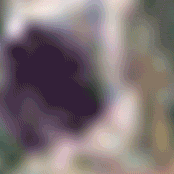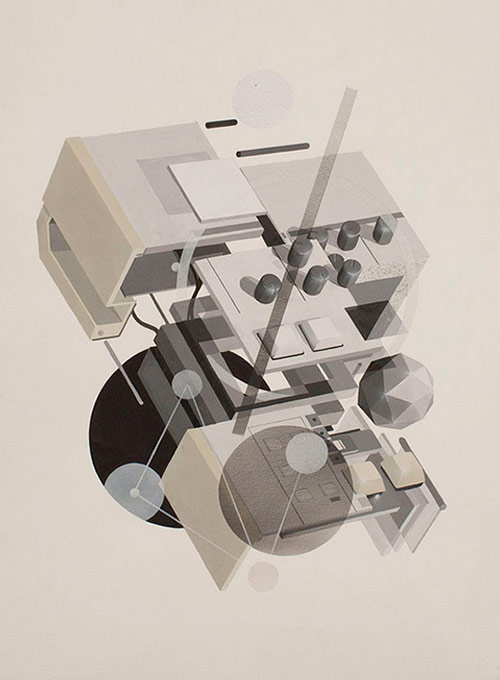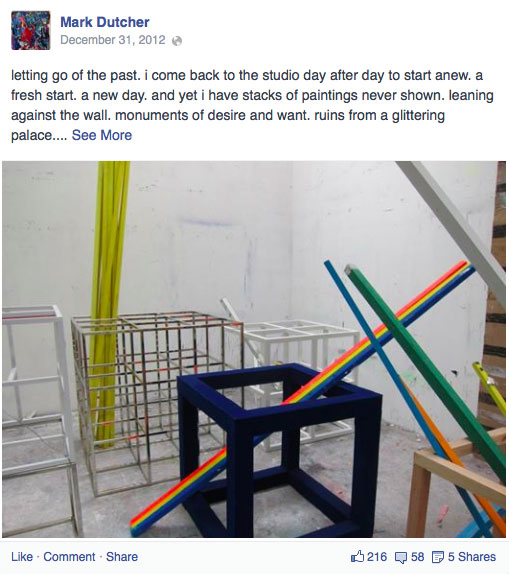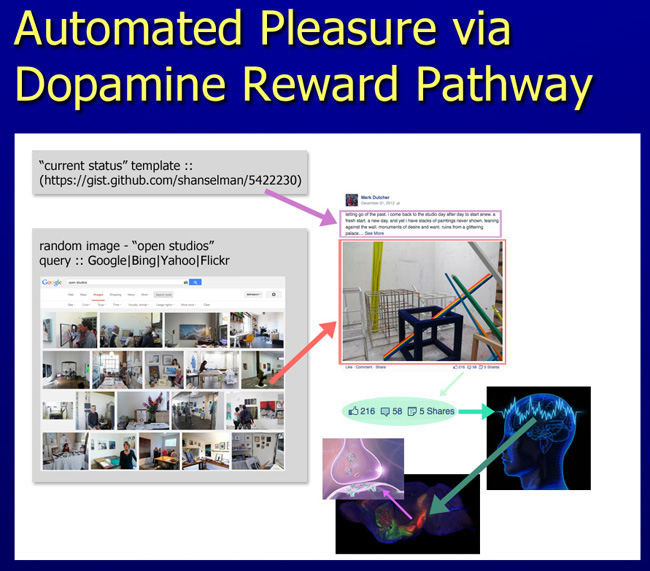
Roid

Exploded views of Roland TR series drum machines, loosely interpreted into quasi-Constructivist compositions, done with gouache and acrylic on watercolor paper.
Dataisnature says the artist is "Roid" but the Flickr page says "O'Really (harvey human) (ian cognito)" so whatever -- get it straight, people. Mark Zuckerberg wants a unitary identity and you better do it. Roid's graffiti is nice, too, but I saw at least one "sponsored by Vans" in there so am having a Wooster Collective moment of not knowing what's "ad" and what's "criminal mischief in the fourth degree," sorry.
untitled head arrangement

from the tumblr of ckcker
At the risk of spoiling a good joke by analyzing it, this sequence of five found photos encapsulates the tragedy and stupidity of our silicon valley-made, plato's caveman world. The randomness of image search meets clickbait buttonpushing mechanics, hollowing out the already hollowed out. There is a kind of algebra, or set theory, at work here: three images of cheapened sadness (the abashed celebrity at the moment of crisis), fear (the bloody hollywood FX head), and yuks (the parked domain meme reenactment), forming an emotional triad that must be offset by not one, but two, creepy goalie masks in order for layout feng shui to be achieved.
other people's thoughts on facebook jonesin'
1. Rene Abythe shows us in graphic form what is happening in the brain of the painter with the Facebook open studio that we ridiculed in the previous post (click image for full-size version, previously posted on dump.fm):
2. From wierdnumber: "[science fiction] lampoon of the idea of a 'like economy' though the site which hosts it is quick to follow it with a 'like this on facebook' button"
3. From Miracle Jones' short story "Ladykiller":
[a man talking to his fiancee] "We are gonna talk about Facebook in the future like our parents talk about cocaine," he said. "Man, I can’t even remember that decade. I was on Facebook the whole time. I met your mother on Facebook. I did so much Facebook that my balls went numb and I could only fuck on Facebook. You want to see pictures? They are on Facebook."
confess, artists, and others will follow your example
The current CPOTI (creative person on the internet) operates in a shifting, amorphous zone between the two extremes of
1. Theatrically quitting the Net (and then returning with a self-hosted site -- the Kevin Bewersdorf model)
and
2. Surrendering your entire practice to Mark Zuckerberg's advertising honey trap-cum-government surveillance apparatus, as described, not in those terms of course, in this extended Facebook infomercial on the Hyperallergic website (hat tip bill)
John Seed, the writer of the infomercial, was evidently born very recently and thus has no deja vu sensation that this entire "have virtual friends in your studio, listening to you moan about your creative trials and giving you self-serving advice" model was done ten years ago in the so-called blogosphere, and without all the conflicted issues of being grist for someone else's ad machine. (Issues of which Seed seems unaware.)
In fact, some denizens of that era never moved to Facebook. Painter Dennis Hollingsworth, am happy to see, is still maintaining an open studio on his Movable Type blog. How he is able to do this with no verifiable friend count is hard to fathom -- he must be crushingly lonely. Almost like painters were before the internet.
To be fair, Hollingsworth doesn't moan -- his studio diary spares you maudlin, unprofessional entries such as this:

John Seed's article about the above painter uses two words that should cause shivers to anyone who has read a word or two about Facebook's celebrated collusion with government and advertisers: trust ("the sense of trust this [transparency] engenders" "his candor generates trust") and confessions ("Mark’s Facebook posts strike me as brave and honest confessions around the challenges faced by the painter on a daily basis" "Facebook offers a public forum where doubts and confessions can be offered up and support can be offered").
Its true that "talking about some of the melancholy [you] go through in the studio" isn't the same as admitting a crime or peccadillo that John Law or Jane Employer might find intriguing. But post-Snowden, et al, this is probably a better time to be putting on your game face than letting it all hang out. One should be wary of "confession creep." Hyperallergic won't do this -- its ongoing mission is to make Facebook cool for artists. But others might note the example of how not to be, on the internet, at this particular moment. Your vulnerabilities can and will be used against you.

